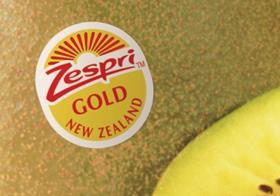
Research findings published in the British Journal of Nutrition have demonstrated for the first time that women with low iron stores who consumed international kiwifruit marketer Zespri's trademarked Gold variety with an iron-fortified breakfast cereal saw a significant increase in their iron levels.
The study, conducted at Massey University in New Zealand, involved 89 healthy women aged 18-44 years with low iron stores (serum ferritin ≤25mg/l and Hb ≥115g/l).
The women received an iron-fortified breakfast cereal, milk and either two Zespri Gold kiwifruit or one banana (known to have low levels of Vitamin C and carotenoids) for breakfast every day for 16 weeks.
Serum iron levels (serum ferritin) were tested across each group before and after dietary intervention. A significant increase in the mean levels of serum ferritin was observed in the group who consumed kiwifruit as compared to the group who consumed bananas.
Zespri Gold kiwifruit are known to have high levels of Vitamin C and carotenoids, both of which potentially aid the uptake of iron and increase iron stores in the body.
Iron deficiency is the world's most common micronutrient deficiency, affecting more than 1.6bn people worldwide, and is the most common cause of anaemia.
The element is an important dietary mineral involved in various bodily functions, including the transport of oxygen in the blood.
Iron deficiency means less oxygen is delivered to the cells, which can lead to fatigue, tiredness and decreased immunity; during childhood and adolescence its absence is known to impair physical growth, mental development, and learning capacity, whike in adults it impairs physical performance and cognitive function.
'As dietary management is often recommended as the first line of treatment for people with mild iron deficiency, this research provides us with evidence that by regularly incorporating Zespri Gold kiwifruit in meals which also contain iron, women can better manage their energy and iron levels whilst providing positive effects onthe brain and the immune system,' said Dr Cath Conlon, principal researcher at the Institute of Food Nutrition and Human Health at Massey University, New Zealand.
'This is the first study of its type to investigate whether a Vitamin C rich food was able to improve iron status in women with low iron stores,' said Dr Conlon. 'Whilst this study has been conducted with women who have low iron stores, it is realistic to expect that others who are at risk of iron deficiency would also benefit.'
Individuals at highest risk of iron deficiency and anaemia include pre-school aged children; pregnant, breast-feeding and pre-menopausal women; and athletes.
'These results further demonstrate how the high Vitamin C levels in Zespri Gold kiwifruit can strengthen the body's natural defences for everyday protection,' said Jodi Tong, category manager for Gold at Zespri and also responsible for the company's health marketing.
'Two Zespri Gold kiwifruit, eaten with iron rich foods, will provide direct benefit to people with low iron levels, or those at risk of anaemia, by increasing the body's iron stores and strengthening overall health and wellbeing,' Ms Tong.






No comments yet